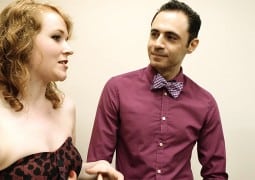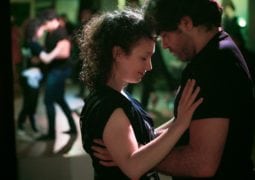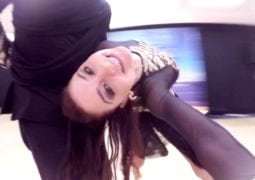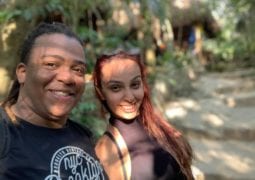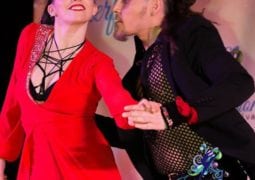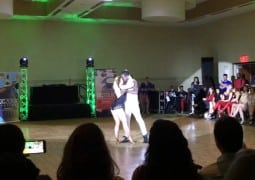Back to Basics with Beginners; Helping Our Community Continue to Grow

You may have heard from dance instructors that it’s a good idea to go “back to basics” occasionally and take a beginner’s class. They may have tried to instil the importance of perfecting fundamental techniques and encourage you to focus on connection and ‘basic moves’, at least as much as complex, extravagant moves that might cause injuries if done improperly.
As a reasonably experienced Zouk dancer I like to challenge myself and when dancing with a follower whose abilities I have confidence in, I often do complex movements and improvisations focusing less on basics and more on overall musicality. I think this is fine as long as you are both safe and aware of the correct techniques for executing moves. However, I have to whole heartedly agree with the importance of going back to basics considering how many injuries I have witnessed or heard of among my dance friends around the world.
Some dancers tend to take shortcuts and lose their technical foundations when they focus more on showmanship than connection. Then there are others who tend to portray themselves as an ‘elite’ dancer, hanging out at the dizzy heights of some hierarchy that should never really exist in the most social and egalitarian of past times, without managing to read the basic counts, or lead a simple move without resorting to brute strength. The reason is often that overconfidence and dancing only with a select, familiar few tends to hinder fixing bad habits and limit improvement. As a Zouk nut I’m happy to say I see this less in Zouk than many other styles. But as a lover of Latin dance in general, it’s a bit saddening.
My personal opinion is that you’ve got to know the rules you break; otherwise you’re not bad ass, just oblivious.
Build walls on the foundation, then roof on the walls. Without foundations the walls cannot stand and the roof collapses. That’s the difference between styling / playing with the music, and being off beat. In order to play with ‘styling’, you have to know the basic steps; in order to play with music, you have to understand the normal rhythm and timing.
I am guilty of this at times, even though I try to be more conscious and mindful in my dance to avoid unintentional slip ups (such as when I forget about the proper footwork when I lead an off-axis travelling turn). I find it hard to focus on so many different facets of movement while also thinking about safety, musicality, and whether the next spin will involve being whipped in the face again by my partner’s hair. But focusing on those little things helps program them into your natural rhythm so that eventually conscious thinking is no longer necessary. Meanwhile, you will have to remind yourself to think about the foundation and check that urge to show off.
The main point of this is article however is not just about going back to basics (although it is related and therefore worth a mention), its about dancing with beginners; more specifically, why it is good for them, for you and for the scene and growth of Zouk. Really, what better way is there to perfect your basics?
I focus on Zouk because that is my love and the only dance that I consider myself anywhere near qualified to have an opinion on. However, the concept can apply to other styles as well. When I say beginner, or newbie, I refer to someone who has either limited or no formal instruction or who may have been to some classes but is not confident social dancing or playing with music and timing.
I’ll tell you a story from about 7 years ago. Like many others, before Zouk I was a Salsa dancer. I went to 2-3 classes per week and continued attending beginner classes even after I was an intermediate level dancer and on a performance team. But I went to very few socials until I started Zouk. In one of those few socials I got left in the middle of the dance floor in the middle of a song. The follow told me I couldn’t dance and walked off the floor.
That night was ruined for me and I was shattered. It would have felt worse if I hadn’t found out that Johnny Vasquez and Edwin Rivera had also experienced similar situations. However, I did learn some lessons, including never to just assume someone would want to dance with me, but to try and earn that. It inspired me to work hard and improve, but also tempted me to give up and walk away. Even though I have been teaching on and off for a couple of years now, and even though I compete as a semi-professional, it still affects me and I think back to that night where I stood in the middle of the floor, feeling like I wasn’t good enough.
Very few of us are born with natural dancing talent, and even then it takes much work to polish it into something nice, like how a ruby must be polished and cut from a rough stone with potential into a glistening priceless gem. I was definitely not born with any raw talent for dancing. I went to classes and learned from teachers. I was slow at first but at some point it started getting easier to move to the beat and execute moves appropriately. It took time and hard work to get to a level where I began to enjoy social dancing. While it may not take others as much time, everyone has a similar story, and we should never forget that.
Unfortunately we tend to forget sometimes that we were beginners once, and that others took a leap of faith to dance with us. We forget that first night out social dancing, gaining the nerve to ask a stranger to dance, standing on the sidelines feeling overwhelmed and hoping someone else from the class would turn up. We forget our own journey of learning. We forget when we were rejected and how we felt (at times) like we didn’t belong. For a leader and follower alike, the first few nights of social dancing are some of the most self-conscious and overwhelming days of their lives.
I have seen how new dancers who are welcomed with open arms keep coming, practicing and growing. I have seen some go from being effectively clueless into amazing dancers in their genre, sometimes in less than a year. I have seen others being ignored or worse; being harassed, that disappear and are never to be seen again. I have also seen some ignored by ‘elite’ dancers, only for those same elites to clamour over one another to dance with that person a year later when he or she had persevered through all the cold shoulders to excel.
You don’t want to be that person that ignores someone’s existence on the dance floor and then suddenly can’t get enough of them when they finally get ‘good’ at dancing. People are not goldfish. They remember. Luckily they are also forgiving. People generally are not that petty, but that does not mean they will respect you, or think that you are doing what’s right for the scene.
Typically, when newbies really fall in love with a dance they become hard-working and grow. This is helped by the fact that while some have big egos, many people in the dance scene, especially the Zouk community, are genuinely warm and caring social animals who will take that leap of faith.
Obviously while beginners blossom, experienced dancers transform, their lives change, they have children, they get new commitments and opportunities and move on from this passion to the next. So the dance scene depends on a continuous infusion of new blood to stay alive and to keep growing and glowing.
When it glows, it gives so much; friendship, emotional support, stress relief, fitness, confidence, career opportunities, love, and refuge, just to name a few. When it doesn’t glow, it is gloomy, despondent and (for the regulars at least) it leaves a hollow void. Hence, we must all play a part in insuring that the flame continues to glow. Think about that group of warm caring souls who made us feel welcomed and believed in and nurtured us when they did not have to. How we can give back to the scene that we take much from?
…By welcoming beginners and making them feel at home.
As the scene grows, so does the list of my favourite dancers, which means I can’t dance with every beginner on a given night. Luckily these two groups are not mutually exclusive, and many ‘beginners’ are an absolute dream to dance with.
This might have something to do with their level of presence. Newbies generally seem excited to dance with me and have laser focus and attention to my lead since their muscle memory is not fully set. They also seem to refreshingly enjoy even the simplest moves of the dance and have no false pretences or expectations. And I, in turn, can be myself and be silly. What makes a dance enjoyable for me is not just the skill of my partner, it is enjoyable when she wants to be there and is present. I often find that beginners are typically always present whereas some more advanced dancers have the luxury of disengaging whenever they feel like. Occasionally I’ll feel them looking around the room or just generally disconnected.
Secondly, who better to go back to basics with than a newbie? Beginners sometimes know the basics better than advanced dancers, or at least remember the correct execution of basic moves better since they learned them more recently. As we advance, we decorate our moves and sometimes these decorations bury the fundamentals beneath them, which may not be apparent since our regular partners can read us. Go to a social in a different country, and all is lost. Another reason why advanced dancers should take a beginner class once in a while…
Thirdly, I do not feel pressure or temptation to do anything fancy, which, on a packed dancefloor may not always be a good idea for safety reasons anyway. Dancing with a beginner allows you to focus on the basics, warm up, get into rhythm and ease in to the night.
For a beginner, a dance can be a fun and scary experience at the same time. So when you dance with someone much less experienced than you, there are a few things you can do to make sure they are comfortable and feel safe and welcomed.
Here are some practical tips based on what I have tried and worked well as a leader. You might think they are rubbish (’trash’ if you are American) or they might make sense, either reaction is acceptable.
- Start with simple weight shifts and swaying from side to side, or simply walking, then work your way to Zouk. As you take it slowly at first, build the tempo with the song and lead clearly, they will most likely follow, even if there is an occasional fumble.
- If they do fumble, don’t stop! Try not to explain or correct, but slow down, then go back to swaying, shifting weight, and simple movements to music before getting back to basic step. Create an environment where they don’t feel bad or useless, but where they can relax.
- Create moves as an extension of something they already know.
- If they ask for your feedback then give it at the end of the song constructively, include compliments for what they did do well, and if by the time you finish it is already halfway through the next song, offer to dance the remainder.
- When a beginner eventually becomes comfortable with the basic step (in the correct tempo), they will often naturally make connection with the beat. It tends to make more sense feeling it out than when are just shown the basic. This is because in a physical activity like dancing, doing is the best way to learn.
- Don’t be forceful, but to maintain a strong frame and lead changes in direction at the right time, and they will (hopefully) naturally follow with the right footwork. Immediately compliment them on their awesomeness and make a point of saying that the footwork is great.
- Once they are comfortable with foundation moves it is possible to try out other basic moves, ideally involving body movements or stepping and turning. Remember to compliment and be silly and funny, but always present and attentive. The result will be a happy newbie who, even if they are not in love with Zouk, will be confident enough to not runaway and give it another go later.
- Be patient. Make your newbie lead feel at peace, calm and again, don’t stress them out with too much instructions or information. If they get it wrong, you will have to give hints, but subtly. This can be done by changing weight to the right foot and subtly applying some pressure through your connection to suggest the lead to do the same. Smile, but focus and let them move at their pace. Note that the pressure and resistance of your response can communicate to the lead, how much to move, when to stop etc.
And once we get these beginners hooked, we all know how far people can grow. Seriously some people grow in their dance like Jack and the Bean Stalk. One or two years later the shy person standing nervously in the darkest corner of the dance floor is wowing audiences and partners alike, and gleaming like a supernova on the other side of the world. All this could be because of your patience, kindness and a clear lead or good responsiveness.
So here’s another reason to be good to beginners… You will never know when they will end up as your teacher!
About: Danidu Wijekoon
You may also like...
Sorry - Comments are closed


